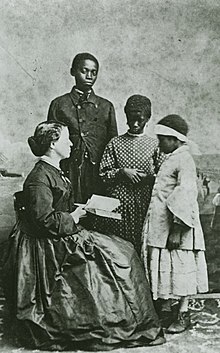Laura Matilda Towne
This article includes a list of general references, but it lacks sufficient corresponding inline citations. (January 2024) |
Laura Matilda Towne | |
|---|---|
 Portrait of teacher Laura M. Towne, a founder of the Penn School, with students Dick, Maria and Amoretta. | |
| Born | May 3, 1825 Pittsburgh, Pennsylvania, U.S. |
| Died | February 22, 1901 |
| Resting place | Laurel Hill Cemetery, Philadelphia, Pennsylvania, U.S. |
| Occupation | Educator |
Laura Matilda Towne (May 3, 1825 – February 22, 1901) was an American abolitionist and educator who founded the first school in the United States for the education of freedmen, the Penn School, in 1862 on Saint Helena Island, South Carolina. The school was established as part of the Port Royal Experiment during the American Civil War.
Early life and education
[edit]Towne was born on May 3, 1825, in Pittsburgh, Pennsylvania,[1] to John Towne and Sarah Robinson.[citation needed]
She studied homeopathic medicine privately under Dr. Constantine Hering. She enrolled in Penn Medical University but there is no record of her receiving a degree.[2]
Career
[edit]She was raised in Philadelphia hearing sermons about the abolition of slavery by her minister, William Henry Furness at the First Unitarian Church of Philadelphia.[2] Influenced by these teachings, Towne answered the call for volunteers when the Union captured Port Royal and other Sea Islands area of South Carolina. With the help of her Quaker friend Ellen Murray (January 31, 1834 – April 7, 1908)[3] they founded the Penn Center on St. Helena Island, the first school for newly freed slaves in the United States.
The Penn Center
[edit]The school started with nine students and operated out of the back room of a plantation house. Laura Towne and Murray spent the next forty years of their lives ministering to the freed slaves, developing their trust, providing them with medical care, teaching them to read and write, and fighting for their land rights. Laura Towne and Ellen Murray eventually adopted several African American children and raised them as their own.
She took care of the school for the rest of her life and eventually gave up practicing medicine. After her death, Penn School was transferred to Hampton Institute, at which time it began operating as the Penn Normal, Industrial, and Agricultural School.
Recognized as a National Historic Landmark, the Penn Center trained generations of students, including U.S. Congressman Robert Smalls (1839-1915). During the Civil Rights era the Penn Center served as a training ground for non-violent civil disobedience by welcoming Rev. Dr. Martin Luther King Jr. Now a National Historic Landmark, the Penn Center celebrated 150 years education, leadership and service.
Towne died on February 22, 1901, on Saint Helena Island, South Carolina,[2] and was interred in Laurel Hill Cemetery, Section 7, Lot 77 to 80.[4]
References
[edit]Citation
- ^ "Only a Teacher - Schoolhouse Pioneers". www.pbs.org. PBS WHYY. Retrieved 30 September 2024.
- ^ a b c Paul, Catherine A. "Towne, Laura Matilda". socialwelfare.library.vcu.edu. Virginia Commonwealth University. Retrieved 30 September 2024.
- ^ "Penn School Papers, 1862-1977 and undated (bulk 1862-1949)". Retrieved 27 May 2018.
- ^ "Laura M Towne". www.remembermyjourney.com. Retrieved 30 September 2024.
Sources
Further reading
[edit]- Butchart, Ronald E. (2010-01-01). "Laura Towne and Ellen Murray: Northern Expatriates and the Foundations of Black Education in South Carolina, 1862-1908". In Spruill, Marjorie Julian; Littlefield, Valinda W.; Johnson, Joan Marie (eds.). South Carolina Women: Their Lives and Times. University of Georgia Press. ISBN 978-0-8203-2938-3.
- Bauer, Natalee Kēhaulani (2022-11-23). Tender Violence in US Schools: Benevolent Whiteness and the Dangers of Heroic White Womanhood. Taylor & Francis. ISBN 978-1-000-77834-2.
- Rose, Willie Lee (1998) [1964]. Rehearsal for Reconstruction: The Port Royal Experiment. University of Georgia Press. ISBN 978-0-8203-2061-8.
- Glymph, Thavolia (2020). The Women's Fight: The Civil War's Battles for Home, Freedom, and Nation. University of North Carolina Press. ISBN 978-1-4696-5363-1. JSTOR 10.5149/9781469653655_glymph.
